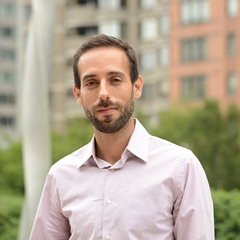Andrew Albin

Associate Professor; Director of Graduate Studies (DGS)
BA, Johns Hopkins University; MA, PhD, Brandeis University; LMS, Pontifical Institute of Mediaeval Studies
Research and Teaching Interests: Late medieval English literature, drama, and culture; early modern drama; aurality and sound studies; music and literature; history of the senses and the body; history of the book and reading practices; performance and cultural theory
-
Andrew Albin's scholarship in the field of historical sound studies examines embodied listening practices, sound’s meaningful contexts, and the lived aural experiences of historical hearers – in a word, the sonorous past – as an object of critical inquiry. His work has been recognized with grants and fellowships from the American Council of Learned Societies, the Medieval Academy of America, the Pontifical Institute of Mediaeval Studies, and the Yale Institute of Sacred Music. He facilitates the Fordham Medieval Dramatists in their biennial performance of early English drama for public audiences in NYC and abroad. He is the author of Richard Rolle’s Melody of Love: A Study and Translation, with Manuscript and Musical Contexts (Pontifical Institute of Mediaeval Studies, 2018) and of numerous and award-winning articles examining the sonic modalities of later medieval English literature, particularly the writings of Chaucer and Richard Rolle. With Andrew Kraebel, he co-edited a special issue of Speculum, “Reassessing Richard Rolle,” forthcoming in 2024. His monograph in development seeks to transform the way we read and understand medieval manuscripts by theorizing the codex as an expectant, cooperative instrument that anticipates and solicits futures in interactive sound.